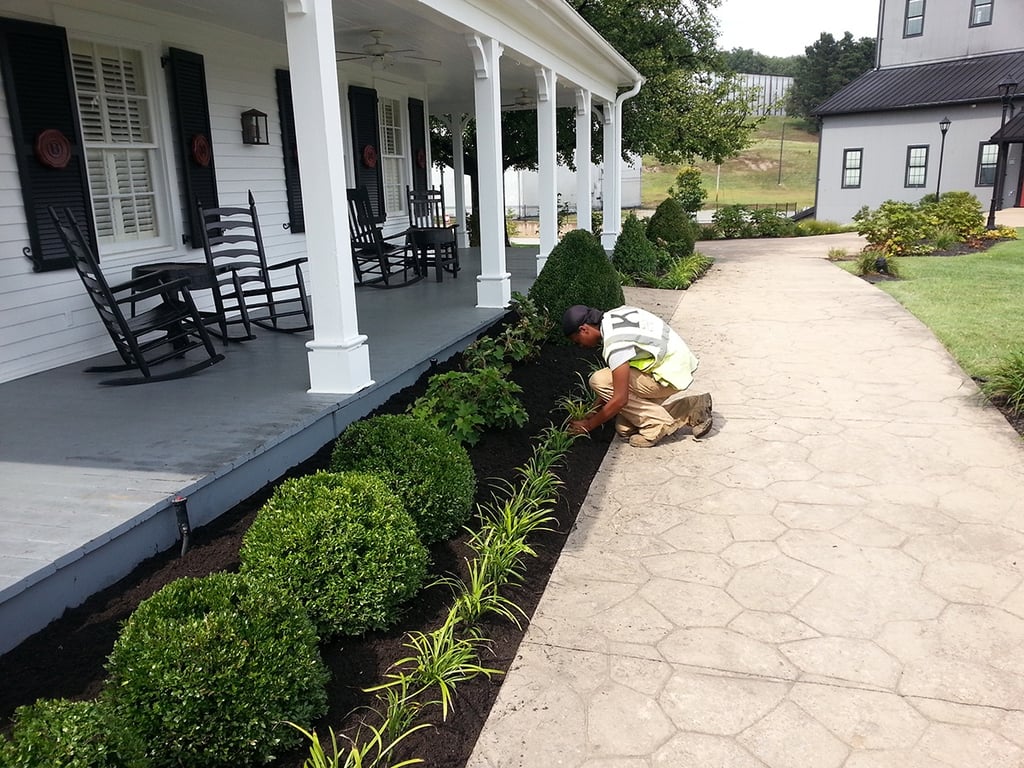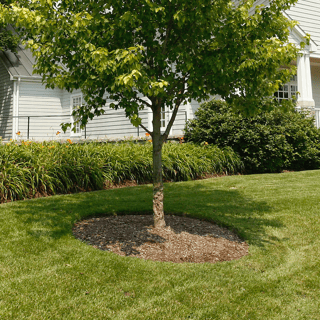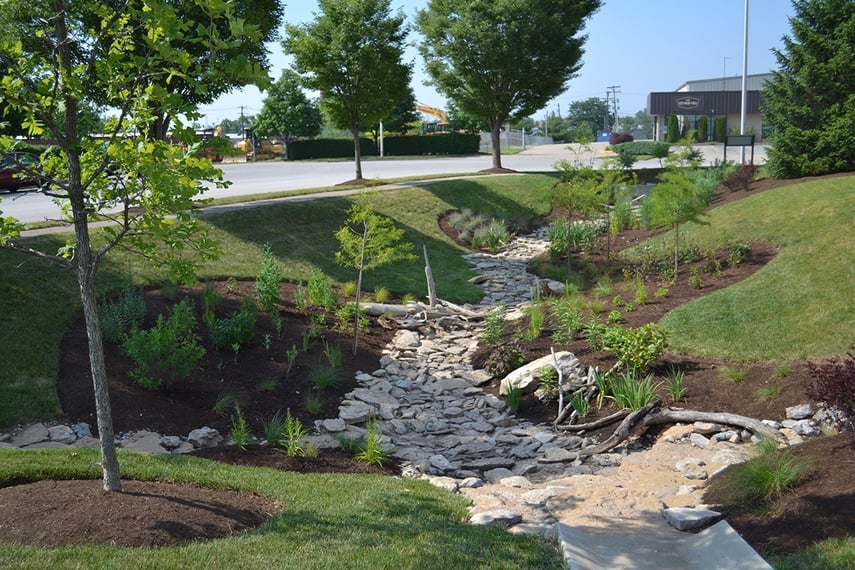When we talk about sustainable practices and green infrastructure, the landscape projects that usually come to mind are green roofs, rain gardens and permeable pavers. But the reality is, we can make a big impact on our commercial properties by selecting materials thoughtfully and applying them correctly. And, when we rethink the way we approach basic landscape practices like mulching, even standard maintenance can be a significant step toward improving the ecosystem on your property.
Mulching should go beyond simply putting down material for aesthetics. In fact, appearance is an ancillary benefit of mulch and not at all its primary purpose. Mulching properly provides plant health and cost-saving benefits, contributing to the value chain of becoming more sustainable.

We always encourage property owners to think beyond curb appeal and consider how their landscapes can “do something” beneficial. Mulch is a perfect example of how you can approach a necessary spring service with a sustainable approach and realize more value.
We know that the benefits of mulch include preventing erosion, improving soil and plant health, and retaining moisture. But let’s talk about how these mulching benefits contribute to the big picture of a more environmentally balanced commercial property.
Selecting Sustainable Mulch
There is a range of mulch you can choose for your Central Kentucky property, but to get more sustainable value from this material it’s important to consider how mulch is harvested and processed. For example, cypress mulch is wild harvested from forests and devastates this beautiful native species. The deforestation causes flooding problems along coastlines. Cypress mulch is not an environmentally friendly product. Dyed mulch also is not recommended for landscapes, though it often appeals to property owners because of its rich color. (But remember, appearance is a side benefit—not the main purpose of mulch.) The content of dyed mulches can actually harm plant and soil health, seep into water run-off and negatively impact the environment.
Some property owners who move here from the Southeast ask for pine straw and pine bark, which are the most popular and accessible mulch in that region. The problem is, we have to ship in that product, so that impacts cost and the travel makes it less sustainable.
The most commonly used mulch in Central Kentucky is shredded hardwood mulch, which is cost-effective because it is widely available.
As for the way mulch is processed, when you choose bulk mulch you prevent plastic waste that is a bi-product of the bagged variety sold in retailers and sometimes offered by landscape companies. By reducing that extra “input” of plastic, you decrease waste and increase the value of your mulch to your overall sustainability efforts.
Improving Soil Composition and Plant Health
The core value of mulch is the way it enhances soil by increasing organic matter. Mulch feeds the beneficial microbes and organisms in soil, which crave the carbon-rich material in mulch. With this better soil biome comes improved water infiltration and aeration. So, plant roots get more air, water and nutrients—all of the essential elements plants need to thrive. When the soil ecosystem is improved, you have healthier plants that are more disease- and pest-resistant. You’ll spend less time and money treating problems, and reduce the risk of having to completely replace plants that are failing.
In a way, mulch is the ultimate vitamin for the flowerbeds, tree rings and landscaped areas of your commercial property. It’s a tool to improve overall plant health so you can avoid costly “medicine” and maintenance.
Enhance Water Retention and Prevent Erosion
Mulch acts like a blanket, protecting soil from erosion and helping regulate soil temperature. Mulch also helps soil retain water, which means plants in your landscape beds are gaining these benefits. When the summer weather heats up, mulch conserves water by maximizing the benefit of your irrigation system. Or, it may prevent the need for additional watering because mulch increases soil porosity so it can better “accept” and retain water. We also find that mulch goes a long way toward helping manage storm water effectively because greater infiltration rates means less water runs off into the municipal infrastructure.
Avoid Weed Mat to Maximize Mulch Benefits
Some property owners insist on using weed mat underneath mulch to improve weed suppression. We advise against this practice because the mat actually blocks soil from receiving those beneficial nutrients that improve soil health, porosity and aeration. If you lay mulch down on top of a mat, you might see reduced weeds for a season or two, but not much longer. The weed mat will continue to block proper air flow and water infiltration, and it prevents microbes from breaking down the mulch to improve soil health. In fact, soil under weed mat often becomes anaerobic and leads to sick plants and diseases. For all of these reasons, avoid using weed mat so mulch can do all of its good work for your landscape.
A Tip for Mulching Around Tree Rings
 While we’re addressing how to maximize the value of mulch, take a close look at how you mulch around trees. We advise extending the tree ring to the drip line and mulching this area. The reason is, grass competes with tree roots for nutrients and water. So, if you notice exposed roots at the surface, that’s likely because the tree is searching for the resources it needs to thrive.
While we’re addressing how to maximize the value of mulch, take a close look at how you mulch around trees. We advise extending the tree ring to the drip line and mulching this area. The reason is, grass competes with tree roots for nutrients and water. So, if you notice exposed roots at the surface, that’s likely because the tree is searching for the resources it needs to thrive.
By removing grass, extending the tree ring, and mulching that area with shredded hardwood, your trees will gain the benefits of mulch. You’ll find that you will spend less time and money managing diseases, pests and other tree health problems. You will also save money by not trying to grow grass where it doesn’t thrive, under the shade of trees. This goes back to the value chain of improving sustainability from an environmental and financial perspective.
Think Beyond Curb Appeal With Mulch
Mulch can provide significant environmental and cost benefits to your commercial property when you choose a sustainable material that’s processed with a mind to reduce packaging. By applying 2 to 4 inches of mulch to landscape beds to enhance soil composition and porosity, you create more fertile ground for your plants. You decrease erosion and the need for watering, in some cases. And you minimize the impact on your storm water systems. Cost reductions come with improved plant health and less of a need for disease, weed- and pest treatments.
Let’s talk more about how your landscape can do more by saving you cost, improving the environment, and forwarding your sustainability initiatives. Call us any time in Lexington at 859-254-0762 or Louisville at 502-264-0127. Or, fill out this simple contact form and we’ll get in touch with you.



